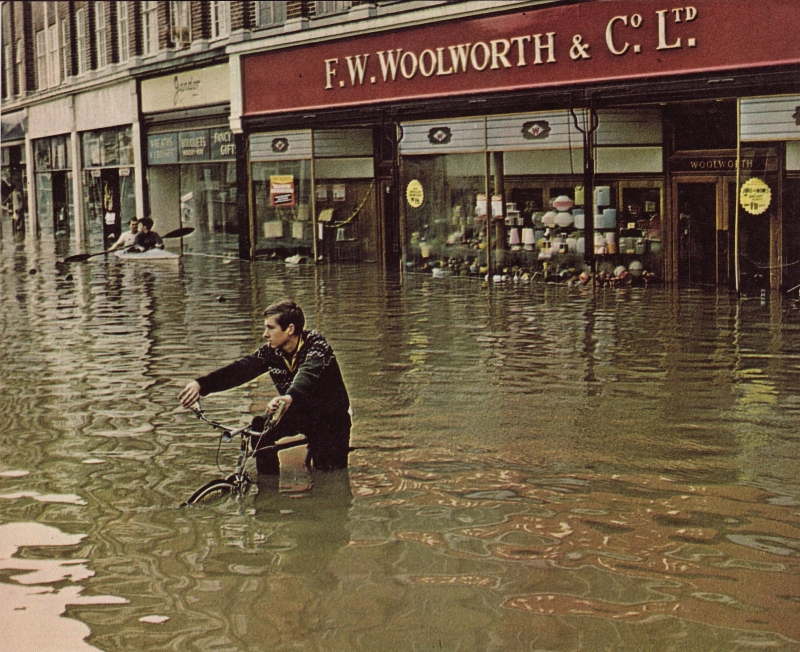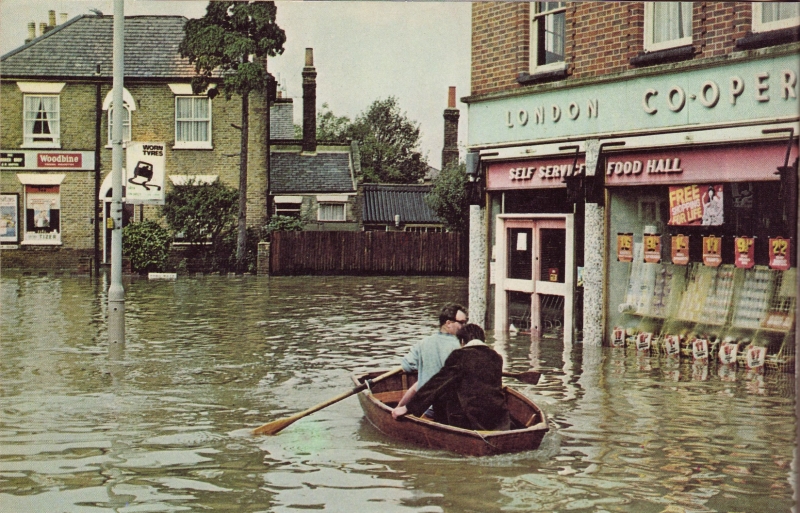The 1968 weather in Britain has been chaotic.
The wettest in years!
Crop damage has soared as never before.
All this, at a time when Britain is already walking a very precarious financial tightrope!
London
BRITAIN'S weather has really gone berserk! In mid September, southeast England received the full brunt of a disastrous torrent which must have recalled to many the story of the Noachian Flood. It was the worst rainstorm in memory.
"The Greatest . . . Rainstorm"
This downpour has been referred to as "the greatest single rainstorm ever recorded over so wide an area of Western Europe." England was the hardest hit.
Britons awoke one morning to find over 1,000 square miles of southeast England covered by floodwater. Central and western Kent were virtually isolated by raging torrents.
A normal 30-day rainfall had hit in a 2-day period! Millions of tons of water were channeled into the narrow and normally sluggish riverbeds in the hilly counties of Surrey, Sussex, Hampshire and Kent. Thirty-nine main roads in southeast England were blocked by floodwaters. Bridges were washed out. Thousands of cars were stalled. Trains and coaches were brought to a standstill. Thousands were marooned.
Torrential waters rampaged to rooftop height through the sleepy little town of Edenbridge, where the normally gentle Eden River rose some 40 feet. Maidstone, Kent, was covered 10 feet deep in a raging torrent. Many other towns, including Molesey, were hard hit.
|
Altergott — Ambassador College
 |
|
WHEN RIVERS OVERFLOW — River Thames floods the greater London area. Total storm damage could be as high as £15 or £20 million ($36-$48 million) a catastrophe the British cannot afford.
"THE GREATEST RAINSTORM" — The greatest single rainstorm ever recorded in Europe hit England the hardest. Photos show Thatnes River as it soaked and damaged business establishments.
|

Altergott — Ambassador College
|
The wettest September day on record was recorded by London's Kew Gardens Observatory — the wettest day since records began there in 1871. But the highest rainfall during this terrible rainstorm occurred at West Mailing, Kent — where 5.18 inches poured from the water-laden clouds in a twenty-four hour period! English rivers, used to light rains only, aren't big enough to handle such runoff.
What was the total cost of this terrible September flood?
Private and industrial insurance claims during this flood are expected to add up to £12 million ($28.8 million); but there was, of course, much property and crop damage which was not covered by insurance. The total storm damage could amount to £15-£20 million ($36-$48 million).
But this isn't all!
This recent flood is not an isolated example of abnormal British weather.
In January, 1968, Scotland received the severest storm damage in its recent history. Gales of over 100 m.p.h. pounded Scotland mercilessly and did tremendous damage to Glasgow and other cities. The total damage to Scotland amounted to about £3 million ($7.2 million).
Then . . . in July this year terrible floods hit the West Country of England, causing £2 million ($4.8 million) worth of damage, and another £2 million of damage was also wrought by storms in Leeds and Bradford.
Worst Harvest in Memory
Overall, 1968 will go down as one of the worst years in recent history of British farming. The 1968 cereal harvest is expected to yield one and a half million fewer tons of grain than last year. A £40 million ($96 million) loss to farmers is expected and some estimate that overall costs to farmers will go much higher than that figure — on top of last year's disastrous loss to foot-and-mouth disease.
Mr. Arthur Brown, president of the National Association of Corn and Agricultural Merchants, told a London Press Conference that 1968 has been one of the worst-ever summers. "This has been THE WORST QUALITY HARVEST IN MEMORY," he said.
As a result of a very wet summer, England is expected "to import a million tons of extra milling wheat to replace the English wheat which is not fit for milling," reports Mr. Gordon Wood, a past-president of N.A.C.A.M.
The News Bureau of Ambassador College asked a National Farmers' Union spokesman: "How does this year compare with previous years?"
"Going right back to June." he answered, "there were severe storms followed by more severe storms in July. This set the pattern for difficult harvests in many parts anyway, and that itself was followed by six weeks dull, cold, wet weather in July and August over the main corn-growing belt. In September there were these great floods. Our cereals expert was looking back through our records and taking all in all, we can't really suggest a year when things were so difficult over such a wide area!"
Ambassador College, U.K., fortunately, had decided to let our farmland lie fallow this year, so our experimental farm program has suffered very little from these unusually heavy rains.
When Mildew Strikes
Many people do not realize the destructive power of crop diseases such as the plant fungi called mildew — which sometimes runs rampant in wet weather.
Britain's Ministry of Agriculture's plant pathologists have recently turned up some startling figures. "Last year MILDEW alone . . . reduced average barley yields by something between 20 and 25 percent, over the country as a whole. . .
"Altogether one can put a conservative figure in the region of £50m. ($120 million) a year on the losses due to these diseases alone. . .
"In other words corn growers have to carry every year losses of a similar magnitude to those the livestock breeders suffered from foot-and-mouth this season." But those losses are for normal years. Mildew damage of crops in Britain will be much higher than normal for 1968.
There is a joke going around here in Britain. A friend went into a restaurant to have lunch. While he was eating, the clouds parted and the sun came out for a short time. My friend lamented the fact that summer came — and went — while he was having his lunch!
Can Rain Cause Famine?
From A.D. 10 until A.D. 1846, there have been 210 recorded famines in the British Isles. The vast majority were caused, not so much by drought, but by too much RAIN and resultant mildew.
What caused the great famine of 1257-59?
"The harvest of 1256 had been spoiled by wet, and the weather of the spring of 1257 was wretched in the extreme. All England was in a state of marsh and mud, and the roads were impassable" (History of Epidemic Diseases in Britain by Creighton).
"Whatever had been sown in winter, whatever had germinated in spring, whatever the summer had brought forward — all was drowned in the floods of autumn" (Matthew Paris, Chronicler of St. Albans).
In 1258: "Rains set in before the corn could be cut, and at the Feast of All Saints (1 November) the heavy crops had rotted until the fields were like so many dung heaps" (History of Epidemic Diseases in Britain by Creighton).
The next great famine occurred in 1315. "With the new crop ruined as it was by rains and floods, the scarcity lessened somewhat, but not before many felt the pinch of hunger and others were seen lying squalid and dead in the villages and by the road sides. . .
"Ordinary flesh was not to be had, but horse-flesh was eaten, fat dogs were stolen to eat and it was rumored abroad that in many places both men and women secretly ate the flesh of their own children or of the children of others. But the detail . . . [which] posterity will be most horrified to read, is that prisoners in gaols [jails] set upon the thieves newly brought in and devoured them alive" (ibid)
The English harvest of 1622 was a very poor one: "Though the latter part of this summer proved so far seasonable, yet the harvest is scant, and corn at a great price by reason of the mildews and blasting generally over the whole realm" (Court and Times of James I, II. 3331).
Nearly two centuries later we read:
"The winter of 1815-16 had been unusually prolonged, so that the sowing and planting of 1816 were late. They were hardly over when a rainy summer began, which led to a ruined harvest . . . in wheat-growing districts, the grain sprouted in the sheaf; the potatoes were a poor yield and watery" (History of Epidemics in Britain by Creighton).
These are only a few of the many historical references. They clearly reveal that too much rain, resulting in mildew and rotting of grain in the fields of Britain, have repeatedly led to famines ravaging the British Isles.
Even the Great Potato Famine of the mid 19th century in Ireland was due, at least in great measure, to a very wet year in which the potatoes rotted in the fields. The summer was so wet that fuel could not be obtained from the peat bogs. This, in turn, resulted in a cold, underfed Irish population which fell easy prey to the typhus plague. Also, English overlords insisted that the Irish farmers send the little grain they managed to harvest to England to pay the rent due on the lands which they farmed. The combined result was millions of deaths from starvation and disease and mass emigration from Ireland to American industrial centers.
This catastrophic summer has been disastrous to Britain. Repeated floods and storms are adding many millions of pounds of liabilities on an already overburdened pound Sterling. Britain will find it even more difficult to balance her budget if she has to continue to import many millions of pounds worth of hay, grains and foodstuffs which she would normally be able to grow.
"Rain . . . in Due Season!"
What the weather experts have somehow overlooked is that God Almighty is the One who really controls the weather. Only He can send the rain "in due season." Only He can make sure that we do not receive too much rain, causing mildew. Or too little, causing drought and blasting.
The Creator would gladly send the rains in due season if we would only quit doing the things that cause us harm and begin to obey Him.
May God Almighty help us to quit harming ourselves — to quit lying, stealing, murdering, committing adultery, and approving homosexuality — and to return to Him in truth and sincerity — so that He can bless us with good weather — with "rain in due season"!